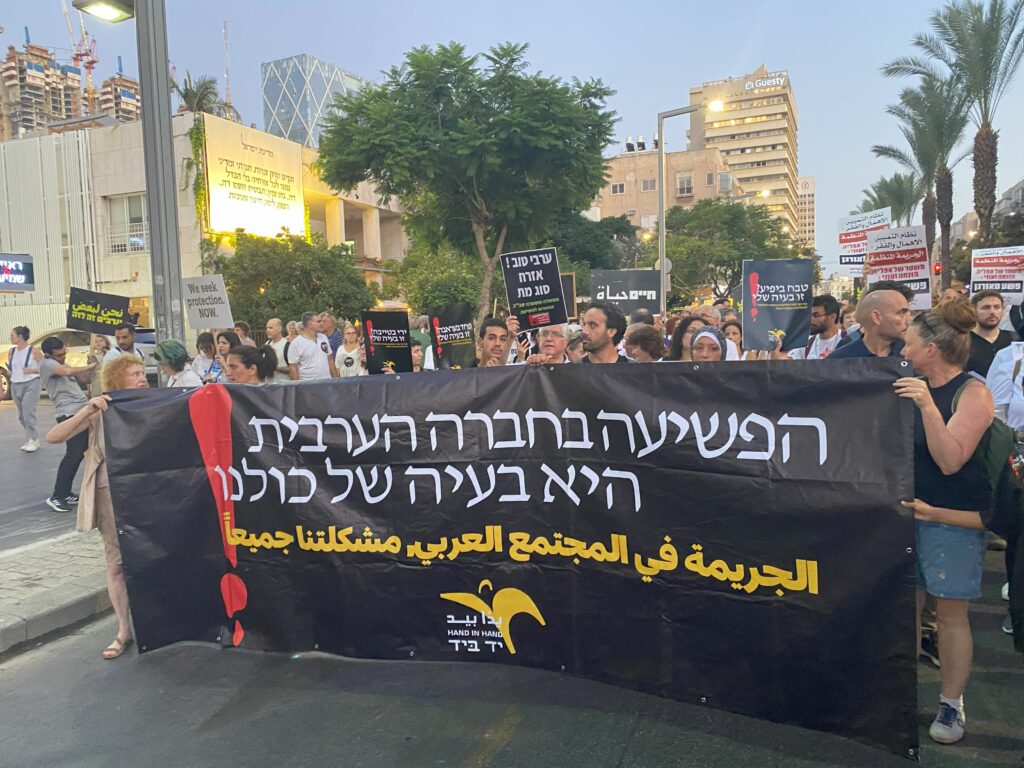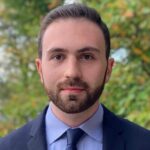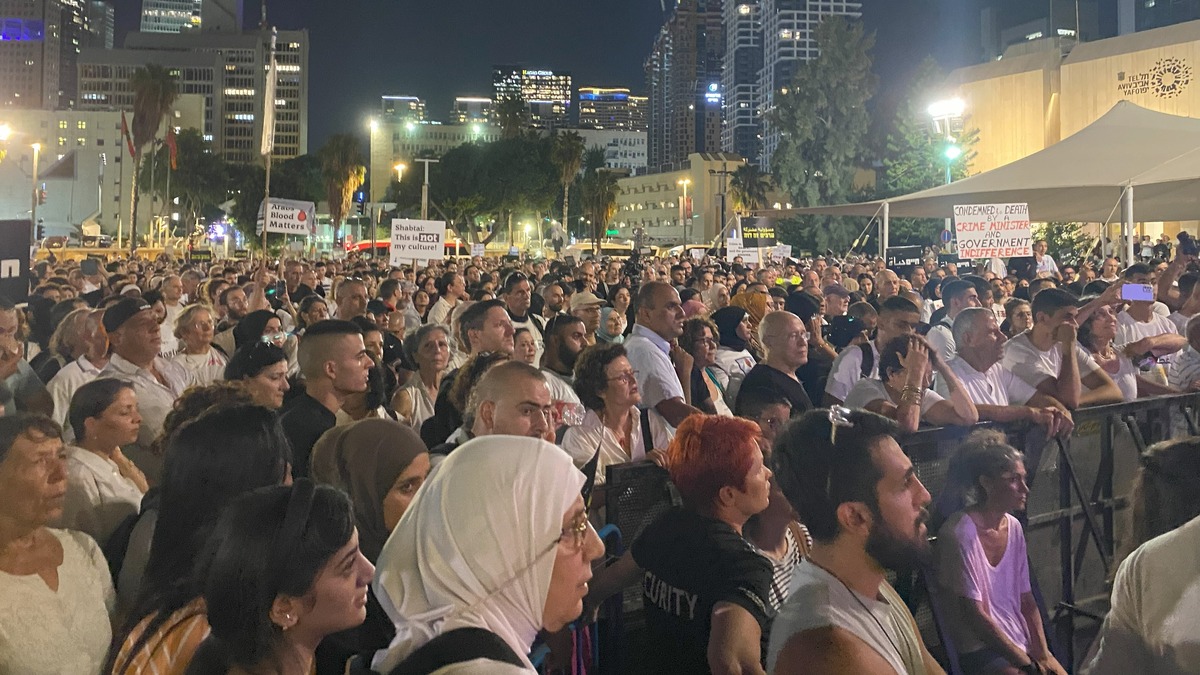“Arab Blood is Equal to Jewish Blood:”
Marching with Arabs and Jews in Tel Aviv-Jaffa
by Avraham Spraragen
Khalas! Dai! The mixed crowd of Arabs and Jews chanted the Arabic and Hebrew words for “stop” as we marched from Habima Square to the Tel Aviv Museum. On the night of August 8th, 2023, thousands of Jewish and non-Jewish demonstrators in downtown Tel Aviv-Jaffa demanded a ‘stop’ to the rising Arab death toll. That is, khalas to the loss of innocent life in the Arab community of Israel, and dai to Israeli government complicity therein. Palestinian Arab citizens of Israel and their Jewish allies held signs that read, “Arab Lives Matter.” The 2023 “March of Death” or “Death March,” was in every way a joint Arab-Jewish movement for justice.
I had just completed an intensive Arabic language study program in Rabat, Morocco, with the generous support of my Arab Studies M.A. program at Georgetown University, in partnership with the U.S. Department of Education. Following two months of daily Arabic study, I visited Israel-Palestine with the intention of lending my Jewish voice (in both fluent Hebrew and now-intermediate Arabic) to the cause of Arab justice. Arabs within and beyond the Green Line face various forms of Israeli discrimination, and Jewish solidarity is required, whether Arabs are killed within or beyond this increasingly-blurred line. While the plight of Palestinian Arabs in the West Bank is the primary focus of my academic studies and human rights activism, Palestinian Arab citizens of Israel called upon their Jewish allies this summer to join them in declaring, “Arab blood is equal to Jewish blood.” Along with thousands of Jewish citizens of Israel, I answered this call; We marched through the streets of Tel Aviv-Jaffa carrying makeshift coffins representing the 141 Palestinian Arab citizens killed since the beginning of 2023 and neglected by the Israeli government.
On each coffin, written in Arabic, were the circumstances of these Arab deaths. What the homicide victims were doing at the time of their killings, such as “on the way to school,” was painted in bold lettering across the sides of the coffins for onlookers to read. The innocence of the deceased, the tragic circumstances of their deaths and the avoidability of such tragedies, as well as the negligence of the Israeli government, were messaged loud and clear to the Israeli public. Delivering that message at the demonstration were prominent Arab and Jewish leaders from the political, academic, and cultural spheres. In both languages, speeches were given by the parents of the Arab victims, and songs were performed by Arab community artists to memorialize the dead. The mayors of Arab towns Umm al-Fahm (Samir Mahamed) and Kafr Qasim (deputy Aaed Bader) were in attendance, as were Jewish members of Knesset from the Arab Joint List, Ofer Cassif and (former MK) Dov Khenin. Most importantly, the Arab and Jewish communities of Israel were equally represented both on stage and in the crowd; some demonstrators wore hijab and others wore kippot, while some spoke Arabic and others Hebrew.

This demographic composition was markedly different from that of the typical Saturday night “pro-democracy” protest in Tel Aviv-Jaffa, characterized by a predominance of Jewish Zionist protestors, Hebrew speaking only, and an abundance of Israeli flags. While fewer participated in the ‘March of Death’ than in the weekly anti-government protests, the former, contra the latter, actually saw Arab-Jewish unity and meaningful Palestinian Arab participation. Indeed, the ‘Death March’ brought the anti-occupation bloc of the Israeli protest movement together with other concerned Palestinian Arab citizens to present a united Arab-Jewish front against injustice. The injustice of Israeli police allowing for homicides in the Arab community, comprised of approximately two million citizens or a fifth of the Israeli population, is emblematic of Israeli discrimination against Arabs for their non-Judaism, whether in the Palestinian territories or Israel proper. Just as Kahanist national security minister Itamar Ben-Gvir and his forces abandoned Palestinian Arabs during the recent settler pogrom against the West Bank town of Huwara — Israeli troops watched as settlers burned the town — so too Ben-Gvir has abandoned Palestinian Arab citizens of Israel. For the Jewish supremacist Otzma Yehudit and their ilk, Arab blood is not equal to Jewish blood.
Israeli police have not adequately enforced law and order in Arab communities, nor pursued the perpetrators of injustice within them throughout the country, exempting murderers (of Arabs only) from punishment. While the official government claim is that police have been distracted by the judicial coup, busy maintaining the calm during weekly protests, the Arabs and Jews whom I marched alongside this summer argue that for Israel, Arab lives simply do not matter. More evidence of this came in June 2023, when the Israeli government under Prime Minister Benjamin Netanyahu approved a new ministerial committee to address rampant violence in the Arab community. Laughably, and tragically, the new committee members are mostly far-right, anti-Arab allies of Netanyahu and only one minister is an Arab citizen of Israel. Among these allies is Bezalel Smotrich, the Kahanist minister in charge of the occupied West Bank, who earlier this month froze government funding for Arab communities. Doubling as finance minister in the current government, Smotrich refused to allocate funds to Arab municipalities and their educational programs in East Jerusalem. Unsurprisingly, the same minister who called for Huwara to be “wiped out” also denies 300 million shekels to Arab communities, claiming the money will be used for “terrorism.”
One of the loudest anti-Kahanist voices in the country insisting that ‘Arab Lives Matter’ is Standing Together, the most significant Arab-Jewish grassroots movement in Israel-Palestine. Standing Together co-directors, Arab citizen Rula Daood and Jewish citizen Alon Lee-Green, stood together in solidarity at the rally on August 8th. Shortly thereafter, the organization announced its campaign for city council in Haifa, Tel Aviv-Jaffa, and Jerusalem under the banner of Kol Ohaveha, which translates to the “voice of her lovers,” i.e. lovers of justice and Arab-Jewish partnership. I visited the Standing Together HQ in Tel Aviv-Jaffa, where I met Alon and invited him and his team to Washington D.C. The Standing Together message of a shared Arab-Jewish future should be heard by Jews in the United States and Israel-Palestine alike — and Partners for Progressive Israel eagerly awaits the arrival of Alon and his team to D.C. this fall.
To forge a shared Arab-Jewish future will require Israeli Jewish society to increase their historical awareness, acknowledge their historical wrongdoings, and make amends for them. Zochrot, the leading Jewish organization in Israel-Palestine for the promotion of Nakba awareness, contends that 1948 Nakba/1967 Naksa recognition, reparations, and repatriation are necessary for Arab-Jewish togetherness. The organization crucially frames the issue as ongoing. In other words, the Nakba has never ended, but rather persists in the form of Israeli occupation forced evacuation, home demolition, construction of settlements, arbitrary detention, killing, and other forms of violence. On August 9th, I joined Zochrot at the House of Solidarity in Tel Aviv-Jaffa for a meeting on these issues with the Moroccan Jewish co-founder of the Israeli Black Panthers, Reuven Abergel. At this event, where my Morocco and Israel-Palestine summer experiences merged, Jews for Palestinian justice congregated to help advance a shared future.
Another such event that I attended during my trip was a meeting of the Balad Party in the Old City of Jaffa. Balad: National Democratic Assembly, an Arab political party in Israel led by Palestinian historian Sami Abu Shehadeh, hosted him in conversation with Iranian-Israeli Jewish journalist Orly Noy and the director of Adalah, Hassan Jabareen. Adalah is the Haifa-based Legal Center for Arab Minority Rights in Israel and Balad, formerly part of the Arab Joint List, is the leading Knesset party for Palestinian liberation. However, as was made clear by the Balad leader at this event, the liberation of his people need not come at the expense of my people. In fact, Abu Shehadeh, with the endorsement of Noy (a rare Jewish voter for Balad) and Jabareen, presented a vision for mutual Arab-Jewish liberation on the path towards a shared future from the River to the Sea.
—

Avraham Spraragen is a dual JD-MA Arab Studies degree candidate at Georgetown University. He previously studied at the Hebrew University of Jerusalem and Tel Aviv University.






The Arabs have been in that area for millennia. Their territory was invaded by the Jews, through history and the Romans who would look for salt to pay their soldiers, hence the Word SALARY. What Israel is doing to the Arabs is just as equal as the Show..All stolen territories should be returned to the original people who were living in that region for millennia. The Jews destroyed Olive trees that were there for millennia’s. It is a eco genocide and an actual genocide of a people who were living there for a long time and I put the blame on the intervention of the UK.